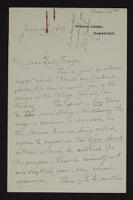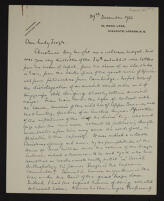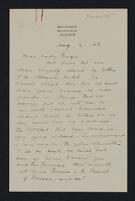Typescript carbon of an essay by Frazer referring to new evidence published in J. P. Mills' book 'The Rengma Nagas' (published in 1937), which corroborates an assertion in 'Aftermath'.
Trinity Lodge, Cambridge - Her husband has asked her to report on the College Council discussions of the Wyse Fund: the Statutes do not allow a double Fellowship being allocated, and no funds allowed for Beneficent purposes may be voted to a Fellow; she does hope 'that a successful plan will quietly be carried out by the user of The Wyse fund'.
10, Wood Lane, Highgate, London, N.6. - On Christmas Day received a number of letters from Cambridge field workers, detailing disintegration of ancient social order in Nepal, hope of contact with the Lawa in Siam, and the importance of the divine king in Africa; has received the Frazer lectures volume and admires it: he says that caustic commentators declared the anthropologists did not understand Rivet's French but thought it beautiful, and the French students understood his French and thought his anthropology wonderful, whereas he enjoyed both.
54 Cours Napoléon, Ajaccio, Corse - In the letter of 18 May, he is worried about her silence after she announced her trip to Switzerland; is putting out a new survey for the Encyclopédia Française for Varagnac; their questionnaires have attracted the notice of ethologists and folklorists; he is not making as much progress in his map work as he could like; Varagnac asked for news and told him of the admiration of all his friends for 'Fear [of the Dead]' III. In the letter of 31 May, he says he will quote from the preface to 'Fear' III, to encourage his volunteers to embrace errors and not doubt their abilities, as his humility should be an example; his plans to go to the country are delayed; Martine [Giamarchi, his great niece] is very happy to have the picture magazine. In the letter of 9 June, he thanks her for her card pointing out that it has been 57 years since the composition of 'Plato’s Ideal' in 1879, and used the preface to 'Crainte' in speaking to his Normaliennes who are working on the ethnological and folklore surveys; he has written to Geuthner; there are two translations of Condorcet, Chouville and Mme de Pange.
54 Cours Napoléon, Ajaccio, Corse - He is pleased things are going well for her; is working with maps of Corsica, and some have Dutch text he cannot read (Jan. 19); he thanks her for various things she has sent in the post: the 'Times', with its coverage of Edward VIII (Jan. 28), an issue of 'Punch', with an image [?] of Canon [Alexander] Nairne at Windsor (3 Feb.) and pictures for Martine [Giamarchi]. He has sent a parcel of responses to the questionnaire to Varagnac; is happy they had a good evening with Wickham Steed (16 Feb.).
54 Cours Napoléon, Ajaccio, Corse - In the letter of 30 October, he is resigned to the fact that they will find a collaborator for Sir James and have their own requirements; refers to the reception of Lilly Frazer’s books at the local school; writes of Madeleine, recovering from typhoid fever, and her brother, who has just received a doctorate in law. In the letter of 29 Nov. he has agreed to organise the surveys for Varagnac for the Encyclopedie Françoise. In the letter of 12 Nov., he is glad to hear they will be at their club until the end of the year; thinks the translation by Madame Roth is ingenious, but it is hard to match the quality of Sir James’ verse. The achievement of 'The Fear of the Dead' is difficult if one cannot reread the documentation and though Frazer has a good memory he should have someone help who can find what he needs and read it to him. All three letters contain news of Martine [Giamarchi, a great niece].
Trinity College, Cambridge - He wishes the news about Sir James was better; the recent sales numbers 'must have something like the effect of a mattress to lie on, keeping one from contact with the cold hard ground'; will not translate Renan, doesn't think he could do it well enough; is not very strong, his life should have ended two years before; recently travelled to Savoy and Dauphiné; suspects her of staying at Buckingham Palace; the Sedgwick elm in the roundabout was blown down in a storm.
Trinity College, Cambridge - Isn't well enough to see Professor Strauman; was in a nursing home in June for weakness of the heart, is in a low nervous condition.
[as from Trinity College, Cambridge] - Thanks her for her letter, wishes the news of Sir James was better; can not nor wishes to stop American anthologies from including poems from 'A Shropshire Lad' but will stop reprints in Europe; is glad to hear there is a Festschrift on the way.
On the verso of the last page, 'Mrs Jacques Huber, 12 Carmen Str.' is written in Lady Frazer's hand.
Trinity College, Cambridge - Many thanks for her effort 'on behalf of my proper feeding'; she looks benign in the picture, hopes the interior corresponds.
Trinity College, Cambridge - Discusses the use of 'tangor' in Ovid. Expresses admiration for Ulrich von Wilamowitz-Moellendorff.
Trinity College - Congratulates Frazer, addressed as 'Optime Maxime', on his 'birthday present', and teases Lady Frazer: 'I think even she must be enjoying a brief moment of contentment'.
Trinity College, Cambridge - Thanks her, but doesn't deserve her thanks any more than the rest of the Council.
Trinity College, Cambridge - Congratulates Frazer; they drank to the three: Frazer, Rutherford and Hopkins, in the Combination Room the night before.
The papers consist of correspondence, writings, notebooks, diaries, music manuscripts, printed material, and photographs which document the life and work of social anthropologist and classical scholar Sir James George Frazer, and to a lesser extent that of his wife, the writer and translator Lilly Frazer (known after June 1914 as Lady Frazer), who acted as his manager and press agent. The collection spans the years 1872-1941, but the bulk of the material dates from the 1920s and 1930s.
Research strengths include Frazer’s writings in the 1920s and 1930s, social anthropology, folklore, classical scholarship, British and French publishing history, and Trinity College academic and social life. The bulk of the collection dates from the last two decades of his life, and therefore contains material from a time well after his reputation was established. While there are letters from people with anthropological data, the collection does not include the vast amount of data and answers to his anthropological questionnaires that he presumably possessed when compiling the first edition of 'The Golden Bough'. Very often letters with anthropological data are in the form of fan letters, whose writers wish to correct or add to information in one of his books.
The papers are arranged in small and repeated groupings, with alphabetical runs of letters followed by writings and printed material, returning to more alphabetical runs of letters featuring many of the same correspondents as the previous runs, more writings, and research materials, and on. The searching abilities of the database will be useful to find all materials by a person or on a subject.
The correspondence is almost entirely incoming, with just 29 original letters from James Frazer (in FRAZ/1) and 15 typed copies of his letters (in FRAZ/1-4, 16, 25 and 29) and twelve original letters, a draft and four typed copies by Lilly Frazer (in FRAZ/1, 3, 17, 31 and 33) in a collection of over 2300 letters evenly divided between the two. In addition to runs of alphabetically arranged letters, there are also groups of letters on specific topics featuring many of the same correspondents. Letters may also be found with writings and research notes elsewhere in the collection.
The correspondence spans the years 1872-1941, however, the earliest dated letter to or from James or Lilly is dated January 1888. There are a limited number of letters from this early period. Many letters addressed to Lilly concern business related to James’ works, and some letters written in the late 1930s are addressed to her to be read aloud to him due to his increasing blindness.
Anthropologists appearing in the collection include L. C. G. Clarke, Edward Clodd, A. C. Haddon, J. H. Hutton, Lucien Lévy-Bruhl, Bronisław Malinowski, R. R. Marett, John Roscoe, and Sir Grafton Elliot Smith. There are only three letters from Sir Walter Baldwin Spencer, but 16 from his daughter Dorothy Young. Classical scholars in the collection include A. B. Cook, F. M. Cornford, A. E. Housman, J. P. Postgate, Sir William Ridgeway, and H. J. Rose. Principal editors and publishers in the collection include James Loeb, George Macmillan, T. E. Page, and W. H. D. Rouse. Other principal correspondents are David Lindsay, the Earl of Crawford and Balcarres; and Sir Joseph Thomson and his wife Rose Thomson. Many of Lilly's correspondents write to her in her native French. Her principal correspondents include François Ceccaldi (many of them written from his native Corsica), Noémi Psichari, the daughter of Ernest Renan; translator Pierre Sayn, and James’ friend W. J. Lewis.
Writings by Sir James Frazer comprise 21 boxes, with additional writings to be found in the notebooks in FRAZ/35. The work represented by the most amount of material in the collection is Frazer’s edition of Ovid’s 'Fasti', published by Macmillan in 1929, and by Loeb in 1931. The papers do not include notes for the preparation of the original 'Golden Bough' nor do they include the manuscript. There are, however, three notebooks containing notes relating to the second and third editions (FRAZ/35/9-11). Frazer’s own copies of the different editions of 'The Golden Bough' are housed separately in the printed books Adversaria collection and carry numerous annotations.
Printed material consists of press cuttings, pamphlets, offprints, and small books. An album of cuttings of reviews of the first edition of 'The Golden Bough' may be found at FRAZ/22/4. Ten small books and pamphlets have also been catalogued into the Trinity Library printed materials catalogue but remain housed with the papers. The music manuscripts are housed in FRAZ/8 and consist of scores composed by Stuart Young setting Sir James’ poems to music. Margaret Rose’s operetta libretto based on Lady Frazer’s story 'The Singing Wood' was similarly set to music (the libretto at FRAZ/32/266 and the score FRAZ/8/1/5).
The travel diaries and many of the notebooks were previously housed on Trinity College Library shelves with printed books and have been reunited with the collection, along with 13 volumes and a small number of loose notes returned from the Haddon Library of Archaeology and Anthropology. The photographs in the collection include 16 photographic prints of sites in Greece possibly taken by Sidney George Owen, two of them dated June 1906 (FRAZ/21/67-82).
Sin títuloGenève, 4 rue Charles Bonnet [on mourning stationery] - Thanks her for 'Feuilles détachées du Rameau d'Or'; their two sons got married this year, the librarian in June, the pastor in August; the pastor's wife died shortly after of meningitis.
News Chronicle, 19/22 Bouverie Street, London - Accepts an invitation from Lady Frazer and Mr and Mrs Basil Worsfold for the 26th.
Librairie E. Nourry, 62 Rue des Ecoles, Paris 5e - Sends a royalty cheque for 'La crainte des morts'.
Ambassade de France à Londres - The French Ambassador has gone to the country; makes an arrangement to meet 14 April.
Ambassade de France à Londres - Congratulates him on the award of the Legion d'honneur; arranges to meet. Accompanied by the envelope, on which is written 'Ambassade. De Fleuriau, Dette'.
Mulberry House, Smith Square, S.W.1. - Is sorry to hear the news of Frazer's eyesight; only met him two or three times at his grandmother's house when he was young; apologises that he can only subscribe to 20 copies (Item 102); accepts her proposal in regard to the inscription; asks for one copy and the rest to distribute as she wishes (Item 103).
4, Buckingham Gate - Thanks for giving permission to use "Dream of Cambridge"; invites them to become members of the Association.
Bibliothèque Nationale - The 'Codex Mazarinianus' is the no. 8864 (Auct.F.4.25) of the Bodleian Library, given by Queen Christine of Sweden to Heinsius with other manuscripts. Accompanied by the envelope.
54 Cours Napoléon, Ajaccio, Corse – Enjoyed the pages of the 'Times' and the coverage of the royal trip to Canada; saves such things for Martine [Giamarchi, a great niece] in 20 years; his old friend Albert Rivaud, whose father he knew, is elected to Lévy-Bruhl's chair at l'Académie des Sciences Morales et Politiques, and in congratulating him mentioned that he knew her, and thanked him for being one of the first to admire 'Le Rameau d'or'; he was visited by two young English women, Miss Joan Quartley and Miss Gwenyth Wilkins, who saw the Frazers' portraits and were proud of the honoured position their countrymen had in his house.
54 Cours Napoléon, Ajaccio (Corse) - Doesn't know why she is complaining of heat when the papers show London flooded, while in Corsica they are pining for water for their gardens and vines; writes of Martine [Giamarchi, a great niece] who is staying with him; reacts to the change from Baba to Pascha [for 'Pasha the Pom'].
54 Cours Napoléon, Ajaccio (Corse), Easter Monday - Thanks her for the photographs; reacts to her news that they are thinking of getting a bigger place, and that Sir James can work 5 hours a day; discusses arrangements to visit Paris in May; Martine [Giamarchi, a great niece]loves to read what Lilly sends; his nephew has retired and they will be going to Cannelle earlier; will be attending a wedding of the daughter of old friends and relatives.
54 Cours Napoléon Ajaccio (Corse) - Thanks her for the cake from the birthday party; Martine [Giamarchi, a great niece] is reading the history of M. Blanc and 'Le Rameau d’or'.
Bateman's, Burwash, Sussex - Her letters haven't reached him, hasn't stayed at the Meurice Hotel for years; the booklet is an improvement on the yellow 'volumette'; wishes they could be at home to receive them and François Ceccaldi later in the month.
FRAZ/1-4 consists of four boxes containing just over 575 letters, most of them addressed to J. G. Frazer. The letters span 1888-1941, but the bulk date from the 1920s and 1930s, and primarily concern Frazer’s works and related personal business. An alphabetic sequence of letters spans the four boxes, preceded by a shorter one of 62 letters in FRAZ/1, and succeeded by a collection of 110 letters written to congratulate Frazer on the award of the Order of Merit in FRAZ/4. FRAZ/1 is unusual in that it includes the only original letters from J. G. Frazer in the papers (29 of them: Items 4-29, 39, 42-43); there are also thirteen typed copies of his letters in this box (Items 44-54, 82 and 84) dating from the 1930s, after Frazer's eyesight failed and a secretary was employed. There are 9 original letters from Lilly Frazer to William James Lewis (Items 30-38), and a copy of a letter from Lilly to Sir John Myres (Item 55). Three other copies of James's letters from the late 1930s appear in boxes 2-4 (Items 2/95, 3/43, 3/47), and there is also a draft of a letter to Lord Stamfordham in box 4 (Item 119). Two other copies of letters from Lilly appear in box 3: to R. R. Marett (Item 3) and Norman Parley (Item 44).
Albemarle Club - Congratulates Cook on his 'Zeus: a Study in Ancient Religion', admires his style and lucidity of argument, approves his decision to avoid questions of ethnology, informs him that he has recanted his position of Zeus as the god of the oak.


![Three letters from 'Jack' [François Ceccaldi] to 'Flaminica' [Lady Frazer]](/uploads/r/trinity-college-library/5/f/7/5f7dda206782de75771b2666e51250ba0d29e0d93a953c54c0a3d09303767db6/FRAZ.32.118-120_thumb.jpg)
![Four letters from 'Jack' [François Ceccaldi] to 'Flaminica' [Lady Frazer]](/uploads/r/trinity-college-library/4/3/d/43dfef9788587e1c732632bff25324812506f4653bf68d6db85861c13e0cfc2c/FRAZ.32.110-114_thumb.jpg)
![Three letters from 'Jack' [François Ceccaldi] to 'Flaminica' [Lady Frazer]](/uploads/r/trinity-college-library/0/2/c/02c9947c571bf3852520e326fc5b7cf2f3ece534c09b21c148330f6737cfa8d4/FRAZ.32.107-109_thumb.jpg)
![Letter from 'Jack' [François Ceccaldi] to 'Flaminica' [Lady Frazer]](/uploads/r/trinity-college-library/7/3/a/73a3d6af1bafd0f150b2393141901eec330aacbdc2498088279ddc80017fba99/FRAZ.32.187_thumb.jpg)
![Letter from 'Jack' [François Ceccaldi] to 'Flaminica' [Lilly Frazer]](/uploads/r/trinity-college-library/8/e/1/8e13c7837fb90e9436a1113d5b5569e3e3b1ac1ce2e4d3ce3bfba5aa7730555a/FRAZ.32.145_thumb.jpg)
![Letter from 'Jack' [François Ceccaldi] to 'Flaminica' [Lilly Frazer]](/uploads/r/trinity-college-library/b/6/6/b66b7cd8189963d0e474439895679144f7b48bac84d246275f7d9615fd7757f4/FRAZ.32.136_thumb.jpg)
![Letter from 'Jack' [François Ceccaldi] to 'Flaminica' [Lilly Frazer]](/uploads/r/trinity-college-library/f/a/a/faa857f92dff996789524cd294113bcc1e63a93f09f037950d5ae3f4e7348161/FRAZ.32.133_thumb.jpg)
